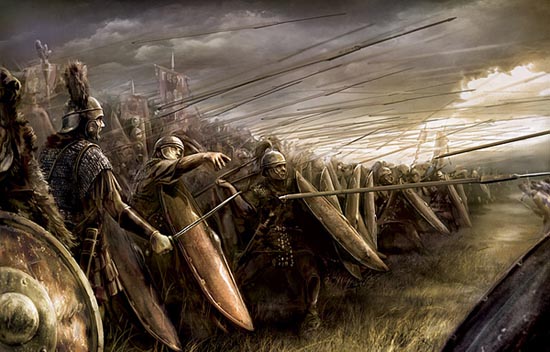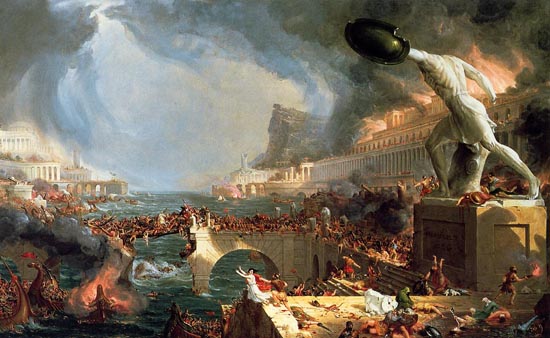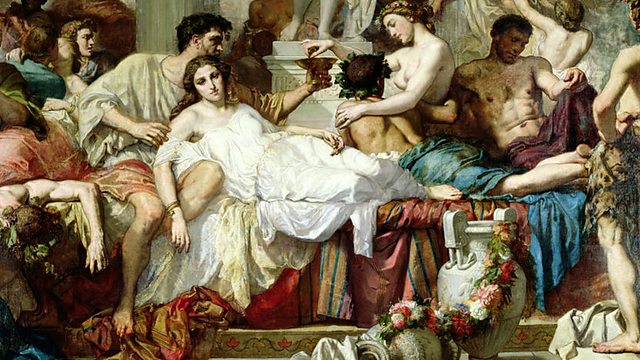John Engelman
American Renaissance
September 4, 2013
In “The Roman State and Genetic Pacification,” published in 2010 in Evolutionary Psychology, Canadian anthropologist Peter Frost presents a fascinating new explanation for the fall of the Western Roman Empire and the rise of Christianity. This explanation provides insight into why the different races have different crime rates. It can also explain why most whites have come to accept the immigration of less civilized races, and why they are willing to make excuses for blacks. Finally, it offers a way to understand some of the ways white Americans differ from Europeans.
Evangelical Christians blame the fall of the Roman Empire on Roman paganism and decadence. In Decline and Fall of the Roman Empire, Edward Gibbon blamed Christianity. People often blame public misfortunes on what they privately dislike. Dr. Frost offers a biological explanation.
In Paleolithic and Neolithic societies all men participated in war. The best warriors had several wives and more sons, who inherited their aggressiveness. With civilization, the military becomes a professional specialty, and most men have no experience of combat. As governments increase in power, those who are submissive to authority have more children than those who defy it.
Dr. Frost’s argument is that by crushing rebellions and by executing criminals, the Roman government removed physically aggressive men from the gene pool. He points out that variation in physical aggressiveness is heritable, and cites figures of 40 to 69 percent, depending on the study. Over a period of centuries, as aggression was weeded out, rebellions became rare in the Roman Empire, the crime rate fell, and a genetically pacified population became receptive to Christianity, with its emphasis on gentleness and submission.
Dr. Frost does not mention this, but while the Roman Army killed some aggressive men, it also attracted others into service, thereby reducing the number of descendents they would have. Enlistments in the Roman Army were usually for 20 years. When soldiers were discharged they were often given land to farm, but many were too old to begin families, and it was next to impossible for an enlisted man to raise a family. The children some of them may have had with prostitutes, bar maids, or an occasional rape victim probably had a high infant mortality rate and a short life expectancy.

Eventually, marauding barbarians crossed the borders of the Roman Empire. They looted, raped, and killed a population that lacked the ability to resist effectively.

When the Roman government acquired a monopoly on the legitimate use of violence, the kind of men who had previously been most prolific were bred out of the population. Selective fitness was achieved instead by those who were more peaceful. Some violent men joined the military or became rebels, while those with less integrity became bandits or pirates. In each case they had fewer children.
Dr. Frost does not point this out, but the Roman Empire also selected for superior intelligence. Intelligent men became merchants, money lenders, government officials, artists and so on. These men were more prosperous than peaceful but less intelligent men, and more likely to pass on their genes to future generations. During most of history, prosperous people have tended to be more prolific than poor people. It was an empire-wide case of “revenge of the nerds.”
As time went on, literate Roman citizens noticed they were different from barbarians—both those beyond the borders of the empire, and barbarian immigrants. The barbarians were seen as having such traits as “crudelitas (cruelty), feritas (wildness), immanitas (savagery), inhumanitas (inhumanity), impietas (impiety), ferocitas (ferocity), furor (fury), and discordia (discord).”

Dr. Frost’s explanation for the fall of the Western Roman Empire can also explain why whites in the United States have lower crime rates than blacks and Hispanics, but have higher crime rates than whites in Europe.
Americans tend to be more individualistic than Europeans, more suspicious of government, more insistent on the right to own firearms, more willing to defend themselves from criminals rather than to rely on government law enforcement, and more willing to fund and join an expensive military.
Benjamin Franklin wrote in a letter, “Those who would give up essential Liberty, to purchase a little temporary Safety, deserve neither Liberty nor Safety.” A poll on this statement would almost certainly find that a higher percentage of whites in the United States agree with it than whites in Europe.
Europeans who crossed the Atlantic tended to be poor, and were sometimes economically desperate. They wanted better economic opportunities. It is also likely that most were by nature more adventuresome, and less willing to submit to traditional authority, especially absolute monarchs and hereditary aristocracies. Aristocrats would not have tolerated physical aggressiveness, whereas it paid off on the frontier, where the government was weak or nonexistent, and a man had to defend himself and his family against Indians and outlaws.

More recently there has been a tendency to give genetic factors more credence. The civil rights legislation and the war on poverty did not cause most blacks to behave and perform as well as most whites. Increased spending on public schools has not improved academic performance. No Child Left Behind left millions of children behind, especially blacks and Hispanics.
The fall of the Soviet Union represented the failure of an ambitious effort to create a “new Soviet man,” who would be motivated by altruism rather than self interest.

In “The Roman State and Genetic Pacification,” Dr. Frost provides a plausible explanation of what happened 2,000 years ago and of what we see today on the six o’clock news.
 Daily Stormer The Most Censored Publication in History
Daily Stormer The Most Censored Publication in History


